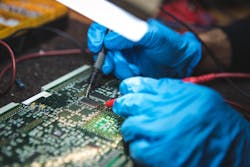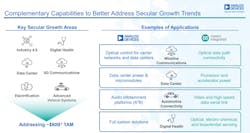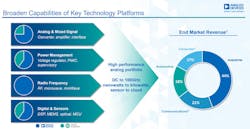Analog Devices to Buy Maxim Integrated in More Than $20 Billion Deal
Analog Devices said on Monday it has agreed to buy rival Maxim Integrated for more than $20 billion in stock to expand its scale and broaden its product portfolio in the market for analog semiconductors.
The all-stock deal would value the combined company at more than $68 billion, creating an analog semiconductor giant that will better compete with market leader Texas Instruments. Analog Devices said the deal would scale up the its footprint in fast-growing segments such as industrial, automotive, data centers and health care.
Under the terms of the proposed agreement, Maxim shareholders would receive 0.63 of Analog Devices stock for each share they own. Once the deal closes next year, shareholders in Analog Devices—commonly called ADI—would own about 69% of the resulting company, with Maxim's stockholders owning the other 31% of the firm.
Both Analog Devices and Maxim are major players in the market for analog semiconductors that are key components of nearly all electronic device, from smartphones and thermostats—to cars and the factory equipment that manufactures them. These types of chips handle the fundamental chore of translating electrical signals—including temperature, pressure, sound, and other signals relayed from the sensors slapped on a device—into digital data.
According to IC Insights, sales of analog chips accounted for around 13%, or $55.2 billion, of the global chip market in 2019. Overall sales of semiconductors slipped 12% to $412 billion.
The chips are also used in other areas, including power management for smartphones and other consumer electronics to boost the energy efficiency of the device and protect the battery from malfunctioning, overheating, and bursting into flames. Analog Devices also radio frequency, millimeter wave, and other analog chips for clarifying and conditioning radio signals used by cellular networks, including 5G.
Analog Devices and Maxim also compete with Texas Instruments in microcontrollers and embedded components that serve as the brains of millions of devices on factory floors, in cars, and household devices, ranging from thermostats to televisions to washing machines. Other chips Maxim sells are designed to protect devices, like connected door locks, from attackers trying to steal secret keys, passwords or other data on the devices.
Analog Devices said the deal would combine Maxim's strength in automotive and data center segments with its footprint in the industrial and communications markets. Once the transaction closes, the combined company will sell more than 50,000 products, allowing it to offer more complete solutions. The company said it will serve over 125,000 customers and be positioned to capture a bigger portion of the overall analog market.
"We see lots of opportunity in both the short term to be able to take the existing portfolio of Maxim products to more and more customers," Vincent Roche, chief executive officer of Analog Devices, said on an analyst conference call to discuss the deal. "And over the longer term, to be able to produce more complete suites of product offerings for our customers by combining the complementary portfolios," he added.
Analog Devices said the deal would strengthen its lineup of analog chips, which generally sell for less than $1 each and often less than 50 cents. But these types of chips are also some of the most profitable in the industry because they can be manufactured on cheaper processes. Analog Devices' gross margin—the percentage of sales remaining after the cost of goods is subtracted—came to 70% last year. Maxim's gross margin was 65%.
Analog ICs tend to remain in use longer than microprocessors and other classes of chips before becoming obsolete. Some analog products have shelf lives of more than a decade.
Analog Devices would also swoop up thousands of Maxim's analog engineers in the deal. Between them, the companies employed more than 10,000 engineers and invested $1.5 billion in research and development in 2019. Competition for analog engineering talent has been escalating in recent years, the company said. Once the deal closes, Analog Devices believes that it will be in a better position to lure the chip industry's top analog engineers.
A combination would also create a stronger rival to Texas Instruments, the largest analog chip vendor, with a market value of $120 billion. TI sells the widest range of chips to the longest list of customers in the global chip business, and commands nearly one-fifth of the $55 billion analog segment. That is almost double the market share of Analog Devices, its closest rival. Maxim controls about 4% of the analog IC market, according to IC Insights.
“Maxim is a respected signal processing and power management franchise with a proven technology portfolio and impressive history of empowering design innovation," Roche said. "Together, we are well-positioned to deliver the next wave of semiconductor growth."
Analog Devices has been reshaped by deals in recent years as it looked to scale out its portfolio of analog products. The company hammered out a deal to pay $2.4 billion for Hittite Microwave in 2014 in a bid to strengthen its status as a top vendor of RF chips in cellular networking gear. In 2016, Analog Devices agreed to buy Linear Technology, a top designer of power management ICs, and its army of electrical engineers for $14.8 billion.
The deals have transformed it into the No.2 player behind Texas Instruments in the market for analog ICs, which is projected to grow from $55 billion in 2019 to $60 billion by 2023.
With its latest deal, Analog Devices is trying to tighten the gap with TI, which reported double the overall sales of ADI last year. A deal would combine the No.2 and No.3 players in the global market for standard, non-custom analog chips, according to Bernstein Research. TI has underscored the vast scale of its product portfolio—more than 80,000 parts—as a key advantage over rivals. TI is one of the most diversified companies in the chip sector.
While a deal would narrow the gap with TI, it would not completely close it. Analog Devices reported $5.99 billion in overall revenue in 2019 compared to around $14.38 billion for TI.
Even though analog products are cheaper to manufacture than microprocessors and other logic chips, they are increasingly difficult to design. "It is actually very hard in the areas such as power and mixed signal for companies to build exact replicates of each other's products," he said, adding that ADI and Maxim's products are highly complementary. "Given the life cycles that our products have, the redundancy on a product SKU level is actually very low."
“The analog market is characterized by uniqueness,” he added.
Customers tend to continue buying the same analog products from the same vendors for years instead of swapping out parts. Prashanth Mahendra-Rajah, chief financial officer at Analog Devices, said on a conference call with analysts that “once you have those sockets, you hang onto them forever.”
Furthermore, the deal could give it more control over the price of its components as well as win it more sockets in areas including industrial and automobile markets over the long term.
Analog Devices said the combined company would have about $8.2 billion in sales annually, and more than 60% of its overall sales will be tied to the industrial and automobile markets, with 21% stemming from wired and wireless communications. Sales of chips slapped on smartphones and other consumer electronics should account for 18% of the combined company's business, the company added.
Analog Devices said the deal would enable it to offer more of the analog and power chips in system solutions. It would be able to, for instance, to combine its automobile audio bus, or A2B, with Maxim's serial communications technology that transfer video and data from cameras, radar and other sensors around the car to its center console. Digital dashboards are replacing the knobs, needles and dials needed to control cabin functions inside cars.
Analog Devices also underlined Maxim's high-performance chips for managing power consumption and guarding against power surges in data centers. Within communications, Analog Devices said the deal would increase the scale and breadth of its wired and optical connectivity chips used in cloud servers and data centers. "Also, in consumer, we have a highly complementary set of customers as well as technologies," Roche said.
“We can now go to companies saying, 'We've got everything for you,' and be able to capture all kinds of different sockets in these platforms,” said Maxim's president and chief executive officer Tunc Doluca, who will join ADI's board as part of the agreement.
Analog Devices said it should be able to slash $275 million in unnecessary annual costs within 24 months of closing the deal, which is expected to occur in mid 2021. Any deal between Analog Devices and Maxim probably needs to go through regulators in the US, China, and Europe before it closes. Boards of both companies have approved the deal.
About the Author
James Morra
Senior Editor
James Morra is the senior editor for Electronic Design, covering the semiconductor industry and new technology trends, with a focus on power electronics and power management. He also reports on the business behind electrical engineering, including the electronics supply chain. He joined Electronic Design in 2015 and is based in Chicago, Illinois.



